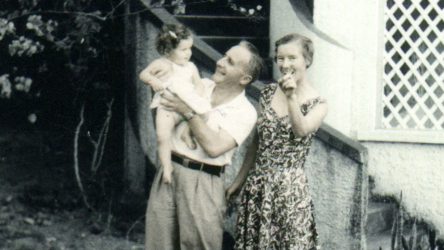The Last Goldfish is a film that details Su Goldfish’s search for her roots. Her father, Manfred Goldfish, was a Jewish German who escaped the holocaust to Trinidad first and once he had escaped, drew a line across his past, refusing to talk about it. Su was always sure there was more than a few lines to this story and this film is her celebration of life, grief of loss and ultimately, a story of family.
Born in Trinidad, Goldfish tells the story of the search for family and roots.
When I went back to Trinidad, eager to rediscover myself and my family, it was a lot harder, she tells us, as there weren’t any people or family there any more, other than my best friend from childhood. The sensory things, though, triggered memories immediately – the food, the smells, hearing the language again.
Pulling together a coherent story was not easy, as Goldfish’s father did not wish to discuss his past.
I started with my father’s archive of photos. He had always been a keen photographer and as such he had taken so many photos over the years and these were one of the few items that he had with him moving from Germany to Trinidad to Australia – naturally, as a refugee, there were very few possessions left. I asked him innocent questions such as, “Who taught you to use a camera?” and “Who are these people in this photo?” and slowly, a story was built up, starting from innocent reflections and slowly moving towards more harrowing stories of anti-Semitism. It wasn’t until he passed away that I discovered he had also been secretly writing some stories, too.
I had a brilliant script editor working with me who would tell me when some bits needed to be shortened, some accentuated and also to encourage me to put bits in. Sometimes, as this is also my story, I felt uncomfortable with sections but as my editor pointed out, we live in a comfortable world and sometimes you need to be uncomfortable to see it like it is.
I am really proud of the film we have created as it acknowledges real people, celebrates life, and while, yes, it is about loss and sadness, there is a joy in being able to tell this story and tell it in a way that people are defined by their lives, not by how they died. That is one reason that while I was in Germany, I visited towns my family were from but not the camps or places they died.
We wondered if, in the process of discovering her family’s story, Goldfish redefined herself?
Absolutely! I have always seen myself as a person with multiple identities – Australian, Jewish, German, Trinidadian, lesbian, an entertainer etc – and I have found that this is something that resonates with migrants and the children of migrants.
You wouldn’t know now from hearing my voice, but when we moved from Trinidad to Australia, I had a pronounced West Indian accent and as a white girl in a school in Australia with that accent, I was endlessly bullied. I got called a cannibal and asked how come I didn’t have bones in my hair. Of course, being white, I found it easy to “hide” my “weirdness” by learning to change my accent. As I got older, I embraced it and now feel proud to use my talents to show not only my family’s story but others who interacted with us along the way.
Clearly, any historical tale of refugees draws comparisons with contemporary asylum-seeker policy. And Goldfish does not back away from this comparison.
The more I researched what happened in World War II, the more I was able to see that the same tactics are being used today. People should not be used as pawns by governments. Two weeks after my family arrived in Trinidad from Germany, Trinidad closed the borders, annoyed at the influx of refugees and then later interned all Germans. My brother was born in the camp in Trinidad and I believe that caused so much of his anxieties later in life.
While we were lucky to find a home in Australia in the end, you know, everywhere my father went, he contributed. He worked hard and made everywhere a better place because that’s what migrants do, they contribute.
Interviewed by Michelle Baylis.
The Last Goldfish screens at the Mercury Cinema Tuesday 31st October.
Check out the official site here.
Bookings available through the Mercury Cinema site.






















